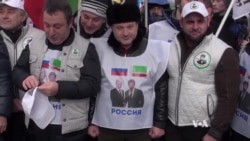As Ukraine marks the one-year anniversary of the “Euro-Maidan” uprising clashes that toppled its Russia-leaning president, thousands of demonstrators in Moscow held what they called an “Anti-Maidan” march.
Thousands of protesters in Moscow Saturday demonstrated against last year's uprising in Ukraine and in support of Russian President Vladimir Putin.
The “Anti-Maidan” group said it aims to prevent a similar uprising from happening in Russia and may use force to stop anti-government protesters
They called for peace in eastern Ukraine while blaming the conflict with Russian-backed rebels on leaders in Kyiv and the West.
Ukraine and the West say Russia supplies military support to the rebels, a charge it denies.
Maidan refers to Kyiv’s pro-European Union protests in February 2014 that led to the ouster of Russian-backed President Viktor Yanukovych, who has since fled to Russia.
Promoted by Russia
Moscow’s "Anti-Maidan" demonstration was promoted in Russia's state media, with Rossiya 24 television channel saying in its broadcasts: "Come, if you like your country!"
Students from a Moscow university said they were told by their dean to attend.
“Putinism forever," said a hand-made banner held by an elderly woman, while some participants in military fatigues had a placard reading "Maidan is an illness -- we're going to cure it!"
Small-business owner Marat stated a common belief among Putin's supporters -- that the West wants to destroy Russia and steal its resources.
"Today's war, and it is certainly war, an ideological and information war in Ukraine using Nazi forces against Russia. Is a war against Russia, it's not a war against Putin,” Marat said.
Many of the demonstrators believe Europe and the United States were behind the “color revolutions” in Georgia and Ukraine that led up to last year's uprising in Kyiv.
Russia's state-controlled media fuel that theory as well as claims that right-wing extremists now control Ukraine.
Some demonstrators, like interior designer Stepan, fear that Russia may be next.
"I'm here to support the unity of the Russian Federation because I know there are forces and people who do not want this unity and that in the future there may be a color revolution like in Ukraine,” Stepan said.
Novorossia flags
Some demonstrators held flags of Novorossia, a czarist-era term used to describe the wider Russian-speaking world in parts of the former Soviet Union.
Ousted Ukrainian politician Oleg Tsarev is with the self-declared “Parliament of Novorossia” and helped organize the march.
"The goal of the United States is to organize war in central Europe. The goal of the United States in to draw Russia into that war, place sanctions against Russia," said Tsarev, chair of the parliament of Novorossia.
Night Wolfs motorbike club leader Alexander Zladostanov, also known as “The Surgeon,” helped form the “Anti-Maidan” group, he told Mumin Shakirov with Radio Free Europe/Radio Liberty.
Zladostanov was sanctioned by the U.S. for his involvement in Russia's annexation of Crimea.
"The main thing is not to remain seated. For me me it is better to die, if that is my fate, as a warrior rather than as a weakling, a victim,” Zladostanov told RFE/RL.
The rally, which comes as Russia is heading into recession caused by low oil prices and Western sanctions, also came a day after hundreds of people marched in Kyiv to honor the memory of the protesters killed during the last year’s pro-EU protests.
Masha Lipman, a Moscow-based political analyst and visiting fellow at the European Council on Foreign Relations, said, “You cannot expect your people to be, you know, fully acquiescent, even if they are loyal to the president. So, I think now the Kremlin should be concerned about the prospect of discontent and is getting prepared.”
Some information for this report provided by RFE/RL.













